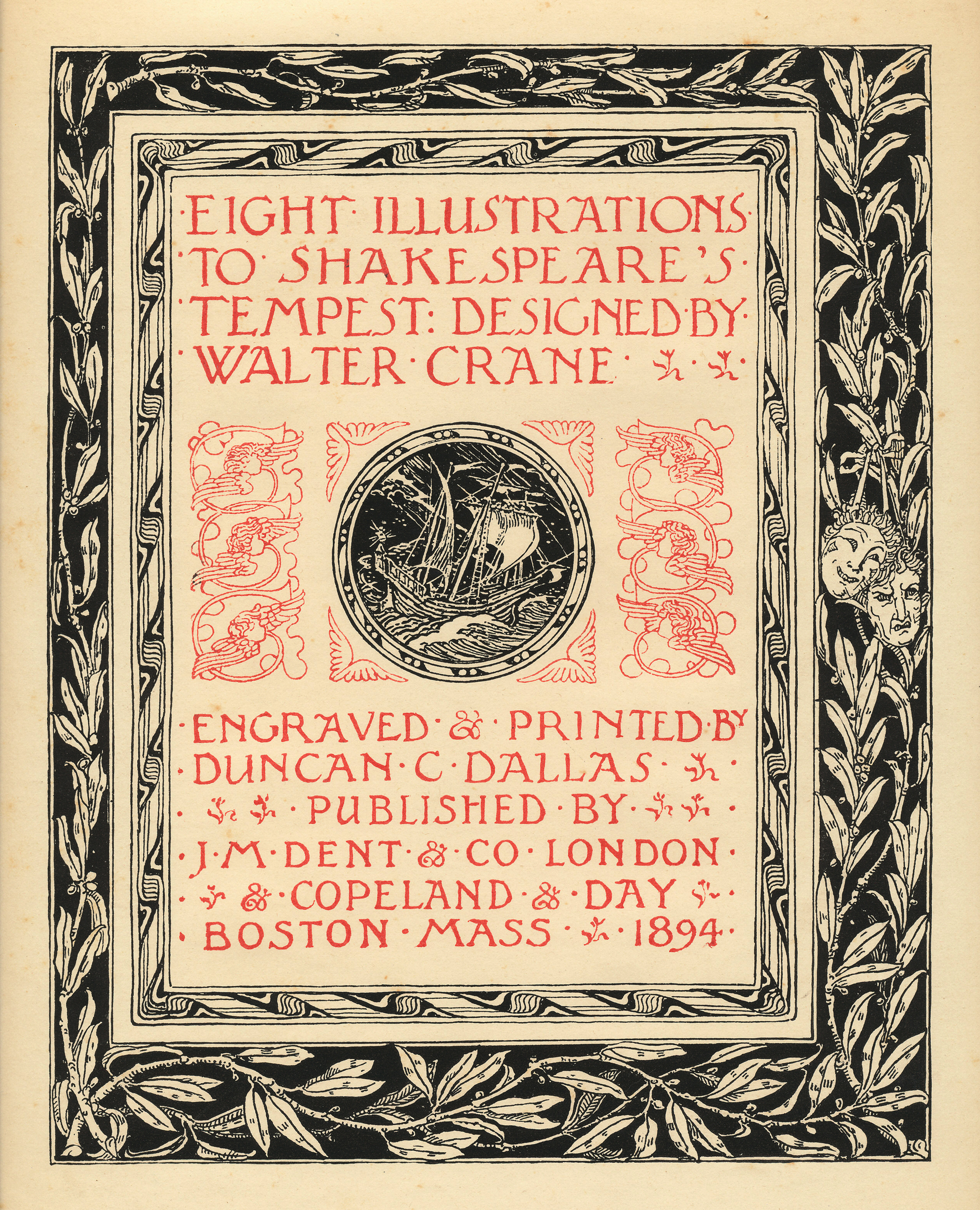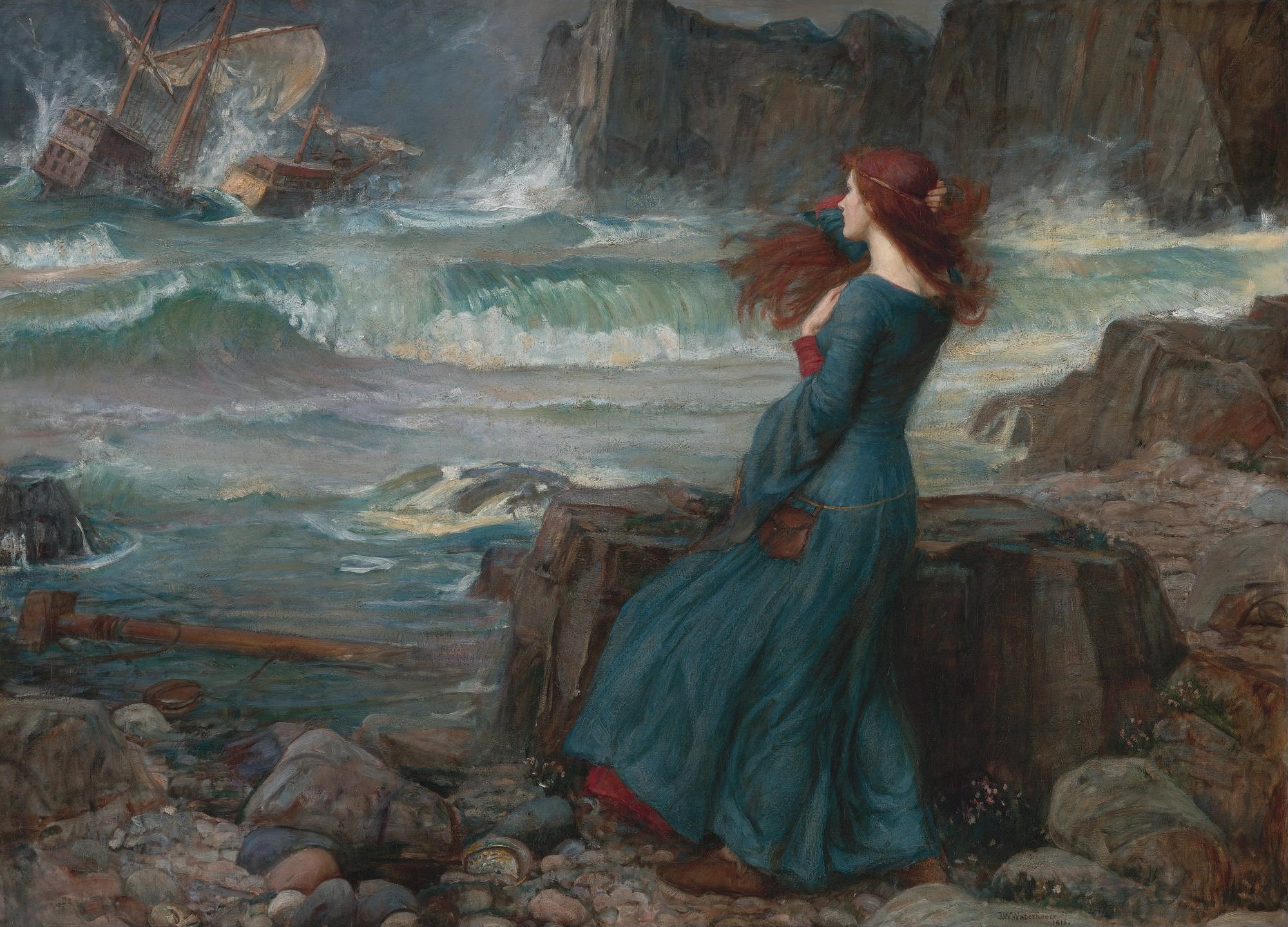 |
| Shakespeare's Tempest Title Page, From Walter Crane's Illustrated 1893 Edition |
The cloud-capp'd towers, the gorgeous palaces,
The solemn temples, the great globe itself,
Ye all which it inherit, shall dissolve
And, like this insubstantial pageant faded,
Leave not a rack behind. We are such stuff
As dreams are made on, and our little life
Is rounded with a sleep."
The solemn temples, the great globe itself,
Ye all which it inherit, shall dissolve
And, like this insubstantial pageant faded,
Leave not a rack behind. We are such stuff
As dreams are made on, and our little life
Is rounded with a sleep."
Shakespeare's The Tempest Act 4, Scene 1
 |
| Miranda - The Tempest by John William Waterhouse |
This painting from the early 20th century depicts Miranda, the daughter of Prospero, who after being visited by a gathering of dancing nymphs, becomes irate before his children and lets out this oft-repeated quote in the final play solely attributed to this great English master of drama.
I'd like to imagine that Miranda, alone on the coast of this strange, continental "New World" island, whose fate is the design of familial power, takes these words to heart, and envisions the great catastrophe of human ambition, as with the same vociferous sight as a sail ship torn in the tempests of the besieging, isolating, and finally, humanizing seas.
I often hear this quote in my head at times, it speaks to me in the volumes as voluminous as the Earth's own oceanic body; a truism for the unconscious, subsurface flesh of all earthly necessity.
__________
At the house of my paternal grandparents, upstate New York, embedded the deep thick of hilly forests, I drift outside the family circle. A lump of earth appears as an ancestral burial ground, laden with the cornerstone of belief in a religious death through a life lived for the proverbial travesty of peaceful rest.  |
| Cauterskill Falls on the Catskill Mountains by William Guy Wall |
In an act outside defiance, towards the inborn will to dream, I flee, bounding beyond the borders of the family lawn towards a new home. My brother, eager to follow in my footsteps, cavorts sheepishly in the pliant mud of earthly selfishness, and looking behind me, I see his devilish eyes smile with ghastly service. He raises a small pistol, and fires. I thumb a ride, and bound tirelessly through traffic, having skimmed the side rails of a merging highway road, a cop notices my automotive thievery, and at once I am caught. In my plea, they capture my brother close behind, warned of his homicidal designs.
 |
| Highway-Byways by Paul Klee |
In the police station, a lawyer sees us, and our family soon becomes present. They find him guilty. I’m barred from seeing him, yet the lawyer slips me a note, a suicide drawing, written with a chipped pencil within the frame of a bullet illustration. “Is he portending to war?” I wonder, free to feed my smaller animal the fun-loving pride of colourful satiation.
_________
America! Why have you buried your deepest, darkest secrets in whispers unheard? Yours is a truth disguised in a white blur as brilliant as the green-footed greed of mad industry. Why do you never step lightly off the strength of Europe's forests, onto world mystery reduced to cartography?What is your name? And since when have you dreamed so shamelessly without thought to the diligent right to be in peace on Earth? Where is your life, if not in the decadent splendor of your shared riches? Why have you become poor with anger, and offered only suicide to your stout-hearted mob?
- excerpt from "America! America!"
“Why have you offered only suicide … to your stout-hearted mob?” Indeed. And offered in contrast is the “unconscious surface flesh of all earthly necessity” at Prospero’s Island, one of my favorite literary haunts (I wrote of the Earl’s stay on the Isle of Man at the end of his life here). He is consoling himself that while the impermanence of all things in creation may be true – that this thing the imagination that can take you anywhere just vanishes once it is disconnected from this baseless fabric our earthen leaden bodies – there is an underlying possibility that by sheer force of eloquence and passion and soulful art that he might breathe undying life into these words and by extension into us too, in the longing for impossibility that carves out a separate sphere inhabitable for the dispossessed. And that all will not be in vain but will live on throughout the ages - these words and works and thoughts and many forms themselves - after all else has crumbled into dust. He says this as a man having known enough misfortune to test anyone’s faith, hope and humor, but buttresses the merest hint of possibility – the dream - with the triumphal human spirit that only Oxenforde could pull off. Is this not the very essence of Nobility?
ReplyDelete